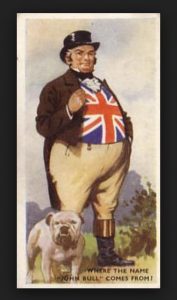RIP John Bull

John Bull, long-lived and much-beloved English yeoman farmer, has died of self-inflicted wounds.
Although born in comparatively modern times (1712), Bull’s ancestors trace their lineage to the fall of the Roman Empire (476 CE). Signal events in Bull’s family archive included the Norman Invasion (1066), signing of the Magna Carta (1215), defeat of the Spanish Armada (1588), and union with Scotland, thereby birthing the United Kingdom (1707). Bull’s finest hour came in 1940, when he and his countrymen staved off a Nazi invasion, saving both the Old World and the New from fascist dictatorship.
Immediately recognizable by his ample profile (a legacy, no doubt, of many a pleasant afternoon at the Village pub), and his waistcoat emblazoned with the Union Jack, Bull was widely admired, both at home and abroad. Washington Irving, American author and creator of such well-known tales as Rip Van Winkle and The Legend of Sleepy Hollow, described him as:
“…[A] plain, downright, matter-of-fact fellow, with much less of poetry about him than rich prose. There is little of romance in his nature, but a vast deal of a strong natural feeling. He excels in humour more than in wit; is jolly rather than gay; melancholy rather than morose; can easily be moved to a sudden tear or surprised into a broad laugh; but he loathes sentiment and has no turn for light pleasantry. He is a boon companion, if you allow him to have his humour and to talk about himself; and he will stand by a friend in a quarrel with life and purse, however soundly he may be cudgelled.”
Bull had been, until recently, a steadying influence on his country’s affairs.
Over the past half-century, however (some would say, dating to the close of the Second World War and the breakup of the British Empire), Bull gradually sank into a deep depression. Haunted by vague recollections of better times (although heedless of the brutal practices of 18th and 19th century colonization which had sustained them), Bull became increasingly snappish. He resented those whom he considered invaders of his homeland, who arrived, not via Nazi amphibious attack, nor as the inevitable backwash of Empire, but via continental policies meant to address the plight of refugees and displaced persons.
Ultimately, Bull’s nativism and xenophobia drove him to take his own life. Adding bitterness to tragedy, not only was Bull’s death unnecessary, it failed in its intended purpose. Rather than protecting his countrymen from financial hardship, Bull’s act of geopolitical self-immolation inflicted immediate and untold damage upon the pocketbooks of his fellow citizens. As a final insult, Bull’s much beloved waistcoat may need to be redone, as Scotland and Northern Ireland threaten disunion from the heretofore “united” Kingdom. Alas for John Bull; “Decide in haste, repent at leisure”
RIP John Bull.













Leave a Reply